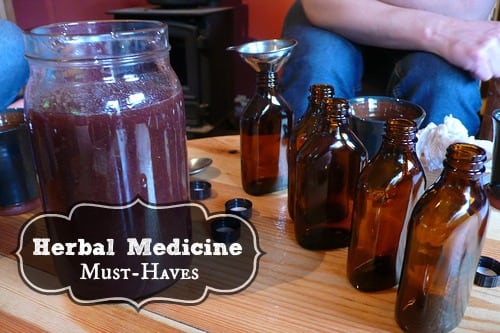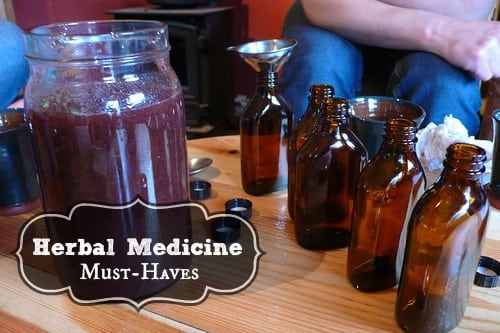Image by Smoobs
By Nina, Contributing Writer
Herbal medicine offers a holistic approach to healing that is appreciated by many natural households. Creating and using your own herbal remedies is a fun and effective way to take control of your healthcare (and it”s a fun to involve your kids, too). Herbs are far cheaper than over-the-counter and prescription drugs – virtually free if you grow them yourself. And you can”t beat the feeling of empowerment when you’ve created an herbal remedy that works.
But what if you’ve never used herbs before? Or you’ve been using them for a while now and are itching for more knowledge and new remedies to try in your home? There are certain must-haves you need to have to properly use herbal medicine and to continue growing in your knowledge of it:
1. Quality Herbs
To start, check out this great post so you’ll know what to stock your natural medicine cabinet with. It’s got a great list of herbs, essential oils and other handy supplies to have on hand. I have been fortunate that my dad has managed a large herb wholesale company for the last 15 years. I see where my herbs come from and how they’re grown. Unless you are growing your own herbs, I suggest researching different herbal companies (like Mountain Rose Herbs and the Bulk Herb Store) to see what their growing practices are and whether or not they offer organic herbs.
Money-saving tip: Ask friends if they have any seeds or starts they can share with you.
2. Trusted References
In addition to buying herbs (or seeds to grow your own), invest in some good herbal resources. That way, you’ll know what herbs you”ll need to use, which ones to avoid with kids/pregnancy and how much to give. Good herbal resources should also include instructions on how to make remedies like tinctures, salves, infusions and poultices.
If you’re unsure where to start, check out Amazon’s book selection. The reviews are like gold when it comes to buying something you don’t know too much about. Two books I use a lot are Herbal Medicine by Dian Dincin Buchman and The Handbook of Vintage Remedies by Jessie Hawkins.
Money-saving tip: Check out several resources from the library and budget to buy the books that you found most useful.
3. Herbal Recipes
The two books I mentioned have a few basic recipes, but the main point of those books is to inform you about different herbs and their properties. Because of that, I also suggest purchasing an herbal recipe book. Many of them can be found online as PDF or Kindle downloads, so you can print them, or pull them up on your Kindle reader when you need them.
I suggest either Herbal Nurturing or Simple Natural Health because they contain different recipes for common ailments. Once you become familiar with herbs and their properties, you can also begin making your own recipes to suit your needs. (That”s when the fun really starts!)
Money-saving tip: Start with recipes that call for herbs you already have on hand.
4. Preparation Accessories
If you’re just going to make infusions, you’ll just need a canning jar with a lid, some herbs and water. Otherwise, you’ll need some additional supplies. Even then, I suggest having several quart-size canning jars on hand. Other items you’ll want to have on hand are:
- Carrier oils like coconut or almond oil
- Medicine dropper
- Jars with lids (I suggest a few different sizes, including smaller ones you can keep in your purse)
- Labels
- A muslin bag or tea basket for steeping herbs
- Mesh strainer/cheesecloth for straining herbs
- Scale for accurate measurements
These items are extremely useful to have around once you begin experimenting with different herbal remedies and many can be found at Mountain Rose herbs or a local natural food store.
Money-saving tip: Look around your house for things you can use before you go out and buy them.
5. A Holistic Healthcare Provider
Lastly, seek out a supportive, knowledgeable healthcare provider. Often, an ailment will be simple to diagnose and treat on your own. There will be times, though, when you’ll need a professional diagnosis so you’ll know what remedy to make. Working with a provider who has a vast array of herbal medicine or is at least supportive of your choice to use herbal medicine first, is a huge plus in natural healthcare.
Money-saving tip: Ask your provider if they will do phone consults or answer questions via email to save you the cost of an appointment.








[…] While you’re there, read these great tips for getting started with herbal medicine, 5 Must-Haves for Using Herbal Medicine In Your Home. […]
[…] 5. Using Herbal Remedies in your Home […]